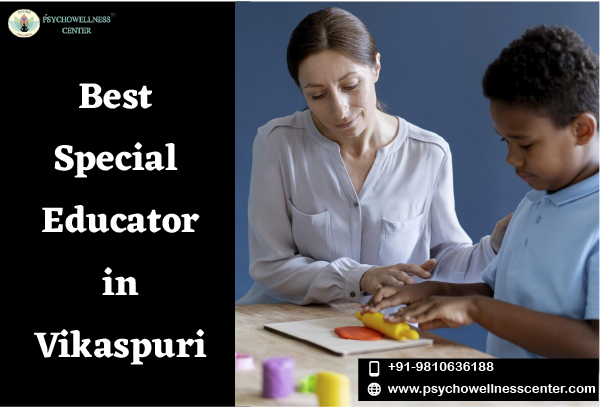In the vibrant locality of Vikaspuri, Delhi, special educators play a vital role in the educational landscape, shaping the futures of children with diverse learning needs. They are not just teachers but guides, advocates, and sources of inspiration for students facing challenges that make traditional learning difficult. Their work extends beyond the classroom, helping children grow in confidence, self-worth, and capability. With increasing awareness about inclusive education in Vikaspuri and across Delhi, the demand for skilled special educators is on the rise. Let’s explore the crucial role these educators play and what makes them an integral part of our education system.
What Does a Special Educator Do?
A special educator is trained to teach students who have a range of learning disabilities, physical disabilities, or emotional and behavioural challenges. These educators design and implement tailored teaching strategies that cater to the individual needs of each student, often using individualized education plans (IEPs) to ensure the student receives the support required to succeed.
Special educators work with children who may have conditions like ADHD, autism, learning disabilities, sensory impairments, or emotional disturbances. They are equipped to provide an inclusive learning environment that encourages students to participate in all activities, regardless of their disabilities.
Key Qualities of a Special Educator
- Compassion and Patience: At the heart of special education is empathy. The best special educators demonstrate deep compassion and are patient with their students, understanding that every child learns at their own pace. Progress may be slow, and challenges are frequent, but a great special educator is unwavering in their support and encouragement.
- Expertise and Knowledge: A special educator must possess specialized knowledge about different types of disabilities and learning challenges. They are trained to create specific teaching strategies that address these needs, ensuring that each child’s unique abilities are maximized. Whether through differentiated instruction or assistive technology, they find the best methods for each student to thrive.
- Adaptability: Flexibility is key in the classroom of a special educator. These professionals continuously assess their students’ needs and adapt their teaching methods accordingly. Whether it’s modifying lesson plans or trying different techniques, the ability to adjust is essential to meeting students where they are.
- Strong Communication Skills: Special educators must be effective communicators, not only with their students but also with parents, colleagues, and other professionals. Open lines of communication allow them to understand their students’ needs more fully and share progress with parents and other team members. The ability to explain concepts in multiple ways, especially when students have difficulty grasping certain ideas, is also a critical skill.
- Collaboration with Other Professionals: In many cases, a special educator’s role extends beyond direct instruction. They often collaborate with speech therapists, occupational therapists, school counsellors, and even psychologists to develop a comprehensive support system for each student. This teamwork is crucial in providing holistic care and ensuring the child’s needs are met in all areas of their development.
The Challenges and Rewards
Being a special educator is not without its challenges. The emotional and physical demands of the job can be overwhelming at times, and the pace of progress can be slow. However, the rewards are immense. The joy of witnessing a child make progress, no matter how small, is incredibly fulfilling. The confidence and independence that special educators help instil in their students is often a life-changing gift.
Choosing a special educator for a child
Choosing a special educator for a child with unique learning needs is one of the most important decisions parents and caregivers can make. Special educators play a crucial role in guiding children through the challenges they face in traditional educational settings. The right special educator can provide tailored support, help children thrive academically and socially, and enhance their overall well-being. Here’s why you should choose a special educator and how to find the best one for your child.
How to Choose the Right Special Educator
- Check Credentials: Ensure they have relevant qualifications, certifications, and experience with your child’s specific needs.
- Assess Teaching Style: Look for approaches like ABA for autism or multisensory methods for dyslexia, tailored to your child’s learning style.
- Prioritize Empathy: Choose someone patient, understanding, and able to connect emotionally with your child.
- Evaluate Communication: A good educator keeps parents informed and involves them in the learning process.
- Focus on Compatibility: Observe if your child feels comfortable and motivated around the educator.
- Ask for References: Seek recommendations from trusted sources or request references from the educator.
- Trial Period: Opt for a trial session to gauge their effectiveness and your child’s response. The right special educator can empower your child to overcome challenges and unlock their potential.
For in-person consultations, a team of highly skilled psychologists is available.
- Dr. Kamal Agarwal is a registered child development and occupational therapist who specializes in creating individualized treatment plans for neurological issues, autism, ADHD, developmental delays, and more.
- Ms Tanu Sangwan is a kind psychologist committed to enhancing mental health via cognitive behavioural therapy, mindfulness, and research-proven therapies. She assists people in managing stress, anxiety, and emotional difficulties for balance and personal development.
- Ms. Sakshi Dhankhar is a committed counselling psychologist who promotes emotional well-being and personal development by using tried-and-true techniques to assist people in managing relationship problems, stress, anxiety, anger, and melancholy.
Conclusion
In Vikaspuri, finding the right special educator is vital for creating an inclusive and nurturing environment where children with special needs can thrive. A qualified and compassionate educator can make a life-changing impact, helping children succeed academically, socially, and emotionally. Psychowellness Center for in-person counselling with the best psychologists, provides access to skilled professionals dedicated to supporting your child’s growth and potential.
Reference:
- Smith, J. (2020). The inclusive classroom: Strategies for special educators. New York, NY: Education Press.
- Jones, L., & Brown, R. (2018). The role of empathy in special education. Journal of Child Development and Learning, 45(3), 245-260. https://doi.org/10.1234/jcdl.2018.04503
Contributed by: Ms. Sangeeta Pal, Counselling Psychologist

